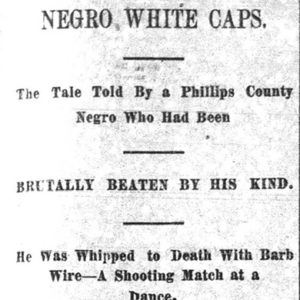calsfoundation@cals.org
Dan Reynolds (Lynching of)
In late December 1888, Dan Reynolds, an African American, was beaten and left for dead near Coffee Creek (Phillips County) by nine other African-American men who apparently disapproved of his relationship with a local black woman. The Arkansas Gazette referred to this incident as “one of the most atrocious crimes ever committed in this or any other country.”
Coffee Creek is located in Big Creek Township, and Dan Reynolds had been living there for almost twenty years. He is listed in the 1870 census as a farm laborer, living with his wife, Vester (or Vesta) who was thirty-nine. By 1880, they had a ten-year-old daughter named Eliza.
According to a report published in the Arkansas Gazette on January 15, 1889, Reynolds had been “decoyed from his home” three weeks earlier, taken to a nearby swamp, stripped, and severely whipped with barbed wire. His assailants then rubbed mud into his wounds and left him for dead. He was attacked because he had “incurred the displeasure of some of his neighbors, owing to his relations to a negro woman who was very popular and had many admirers.” He was discovered lying in the swamp, and although he was taken home and seen by a doctor, he eventually died from his injuries.
As Reynolds lay dying, “Esquire Hudson” asked him to identify his attackers. This may have been O. B. Hudson, who was living in nearby Helena (Phillips County) in 1880. At first, Reynolds refused, fearing retribution, but when promised that the statement would not be used if he recovered, he named the nine perpetrators. After he died, seven of them were arrested, and authorities undertook a search for the other two.
Three of the suspects were identified by last names only: Bently, Garrett, and Murphy. Their identities are not certain, but there were two African-American farmers named Bently living with their families in Big Creek Township in 1880—Emanwel (age twenty-nine) and Carlile (twenty-four). A “mulatto” named John Garrett (twenty-two) was living in Helena in 1880 and working as a waiter in a restaurant. Also living in Helena that year were John Murphy (thirty-four), who was working as a servant, and Anderson Murphy (twenty-four), who was working as a cook.
According to the Gazette, the African Americans in the area were “very much incensed” by the incident, and there was “strong talk among them of lynching the miscreants, which only needs a leader of determination to be carried into effect.” There is no information available as to whether any such lynching occurred, or whether those arrested were ever prosecuted.
For additional information:
“A Brutal Affair.” Memphis Appeal, January 15, 1889, p. 1.
“Negro White Caps.” Arkansas Gazette, January 15, 1889, p. 1.
Nancy Snell Griffith
Davidson, North Carolina
 Civil Rights and Social Change
Civil Rights and Social Change Post-Reconstruction through the Gilded Age, 1875 through 1900
Post-Reconstruction through the Gilded Age, 1875 through 1900 Reynolds Lynching Article
Reynolds Lynching Article 




Comments
No comments on this entry yet.